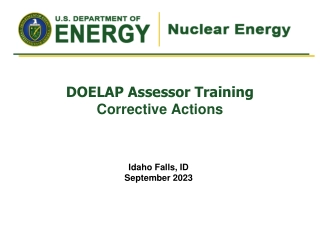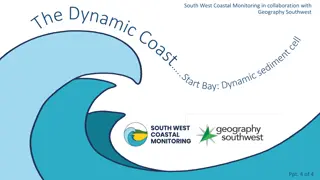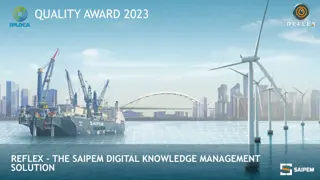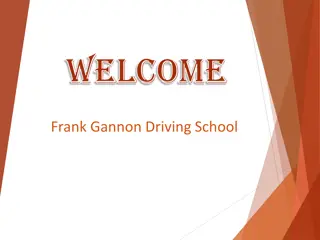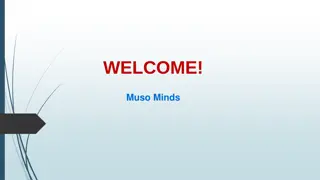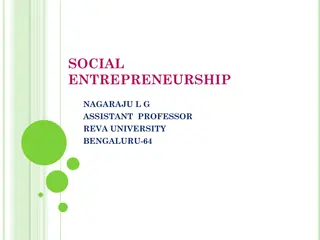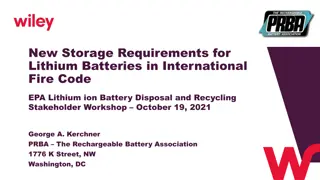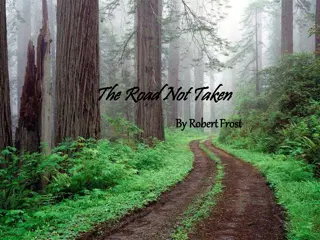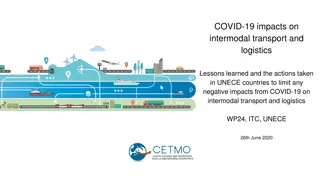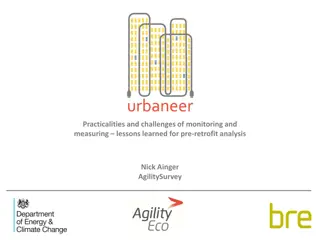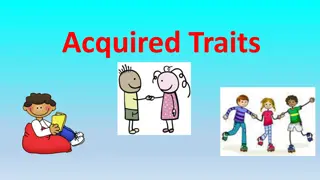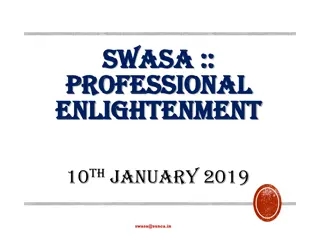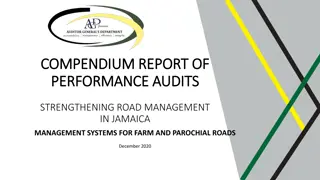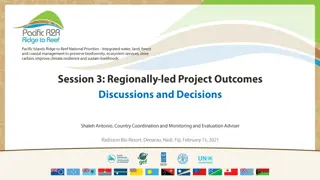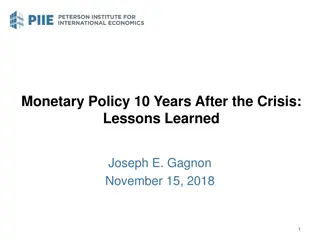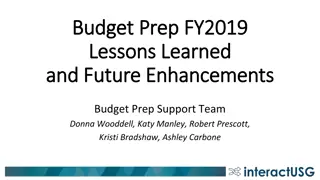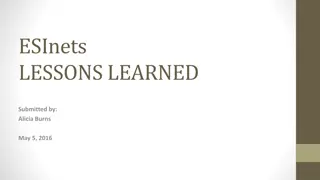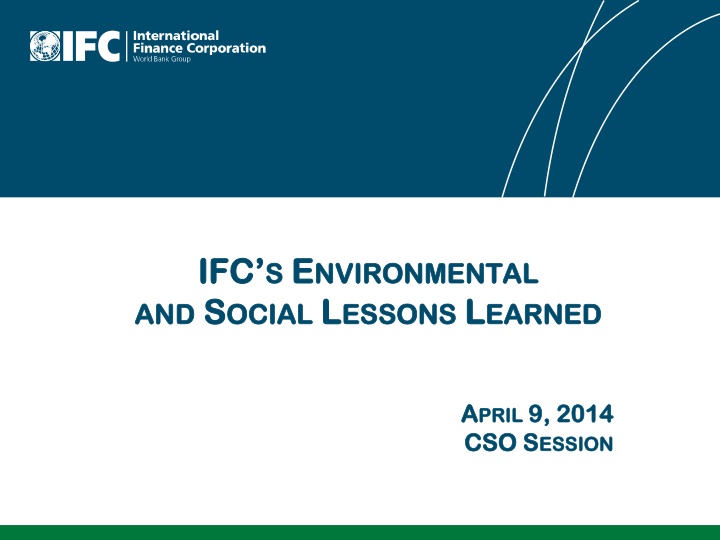
Lessons Learned and Actions Taken by IFC in Social and Environmental Issues
This content highlights key lessons learned and actions taken by IFC in addressing social and environmental challenges in investments, focusing on a case study involving Dinant. It discusses deficiencies in project handling, the importance of internalizing lessons, and the need for continual adaptation in risk management. The content emphasizes stakeholder engagement, land issues, supply chains, labor, and financial intermediaries. IFC's response to complex challenges in high-risk markets and the importance of collaboration within the WBG are also outlined.
Download Presentation

Please find below an Image/Link to download the presentation.
The content on the website is provided AS IS for your information and personal use only. It may not be sold, licensed, or shared on other websites without obtaining consent from the author. If you encounter any issues during the download, it is possible that the publisher has removed the file from their server.
You are allowed to download the files provided on this website for personal or commercial use, subject to the condition that they are used lawfully. All files are the property of their respective owners.
The content on the website is provided AS IS for your information and personal use only. It may not be sold, licensed, or shared on other websites without obtaining consent from the author.
E N D
Presentation Transcript
IFC IFC S S E ENVIRONMENTAL NVIRONMENTAL AND S SOCIAL OCIAL L LESSONS ESSONS L LEARNED AND EARNED A APRIL PRIL 9, 2014 9, 2014 CSO S CSO SESSION ESSION
AGENDA Dinant: Lessons Learned / CAO Audit Learning & Adapting Key themes Links to recent cases Dinant: Update on Action Plan Discussion 2
DINANT: KEY LESSONS LEARNED IFC acknowledges deficiencies in the handling of the Dinant investment: During project preparation, IFC underestimated the broader risks in the Aguan Valley (land conflict, security issues, political instability) When acute problems emerged, neither IFC nor client was prepared IFC s project supervision was not commensurate with level of risk Internal communication and documentation sub-optimal Scope of the challenges in the Aguan Valley go beyond Dinant: Complex history of land conflict/violence requires long-term solutions Limited ability of IFC and client to address this 3
DINANT: KEY IFC ACTIONS We must: Take credible steps on the ground in Honduras with our client Internalize and disseminate lessons learned Ensure we are building these lessons into our operations Continually adapt our approach to E&S risk management Continue to build our capacity to identify and mitigate risks (especially in fragile and conflict-affected project locations) Strengthen ownership of E&S issues across the institution * More details and discussion to follow 4
HOW IFC IS LEARNINGFROM RECENT EXPERIENCES 5
KEY ISSUES Country/Sector Context Stakeholder Engagement Land & Water Supply Chains Labor Financial Intermediaries 6
IFC FACING INCREASINGLY COMPLEX CHALLENGES IFC s target markets are high risk environments Fragile and conflict situations Limited capacity and resources on the ground Low client capacity Weak Institutions Robust E&S risk management will be a key factor in our ability to achieve objectives Broader contextual risks often cannot be addressed through a single transaction alone Enhanced collaboration across WBG is key to success 7
WHATAREWE LEARNINGAND DOING ABOUTCOUNTRY/SECTOR CONTEXT? What we are learning Narrow transaction focus insufficient (Agrokasa, Dinant, Wilmar) Broader contextual and inherent risks, e.g. conflict, security forces (Dinant) Cumulative impacts (Tata Mundra), legacy issues What we are doing Deepen Country Situation Analysis (e.g., for palm oil investments) Broader use of country studies and data from independent sources Enhanced engagement with WBG on the ground 8
WHATAREWE LEARNINGAND DOINGABOUT STAKEHOLDER ENGAGEMENT? What we are learning Insufficient consultation can lead to community conflicts (Tata Mundra, Cambodia Airports) Clients still struggle to do this well (Maple Energy, Agrokasa) Just having a Grievance Mechanism is not enough (Nicaragua Sugar, Harmon Hall) What we are doing Strengthened requirements in 2012 Sustainability Framework, including grievance mechanisms Verification of Broad Community Support, Free Prior & Informed Consent Portfolio review, tools, lessons on Stakeholder Engagement Technical training & guidance for staff and clients 9
WHATAREWE LEARNINGAND DOING ABOUT LANDAND WATER? What we are learning Frequent source of conflict (Dinant, Agrokasa, Yanacocha, Oyu Tolgoi) Challenges of Government-led resettlement (Agri-Vie/New Forest Company) Poor land governance: public to private land transfers; watershed issues are difficult What we are doing Strengthened Performance Standards requirements (PS3, PS6) New risk screening and assessment tools (GMAP, Guidance Note on Land) Applying Principles on Responsible Agriculture Investments Engagement with World Bank, other multilaterals (e.g. FAO, UN Compact) 10
WHATAREWE LEARNINGAND DOING ABOUT SUPPLY CHAIN ISSUES? What we are learning Verification in extended supply chains is difficult (Bujagali) Clients often have limited leverage to improve practices Need for better screening on High Risk Commodities (Wilmar) Labor Biodiversity What we are doing Good practice guidance Agro-commodities and supply chain Child Labor Monitoring Tool Commodity roundtables Expanded scope of verification Better screening tools (Trade Finance due diligence) 11
WHATAREWE LEARNINGAND DOINGABOUT LABOR? What we are learning Increasing concern and source of complaints (Standard Profil, Avianca, Bujagali,Tata Tea, Harmon Hall) Weak implementation of national laws Frequently not under clients direct control Freedom of association & collective bargaining; supply chain; working conditions What we are doing Greater use of external experts on appraisal and supervision Engagement with global unions, ILO Technical training for staff New guidance for staff and clients (contractor management; child labor) 12
WHATAREWE LEARNINGAND DOING ABOUT FINANCIAL INTERMEDIARIES? What we are learning Effective E&S Risk Management Systems are key Time lag: From system to results Need for enhanced IFC supervision (esp. for high risk) Sample of sub-projects Clients need capacity building What we are doing Implementing the Action Plan approved by CODE Increased supervision of high risk FIs Expanded capacity building for FI clients Engagement with broader stakeholder groups, strengthening of authorizing environment 13
GOING FORWARD We will: Share these lessons broadly across IFC Continue to build capacity internal as well as client Increase attention to E&S issues in decision-making at all levels of IFC Strengthen our dialogue with the CAO More actively engage with the Board However, challenges will remain we cannot guarantee outcomes 14
APPROACHFORREVISINGTHE DINANT ACTION PLAN Guided by commitments made to the Board and publicly posted in January Revised Plan is now more comprehensive and robust Sought input and advice from CAO, outside experts, NGOs, Board members, WB colleagues and the client Taking an iterative & consultative approach to build out/refine the Plan Consultation Draft Little IFC or external precedent with respect to backward-looking investigation Plan was presented for feedback to Board Members on April 4 and was publicly released April 8 Consultations with local communities on Draft Action Plan 16
THE SECURITY ACTION PLANAND DINANT'S INVESTIGATION Revised Dinant Action Plan comprises four components (all of which will be further informed by consultation): Dinant Security Action Plan (training, new protocols, compliance investigation of past allegations as per PS 4) Community Engagement Plan (special focus on Aguan Valley Communities, conflict mapping, baseline surveys) Establish Grievance Mechanism (conflict-sensitive) Ongoing Implementation of ESAP (ISO 14000/18000, air emissions, OHS) Result is a comprehensive document that includes all actions Dinant will take to ensure compliance with IFC's performance standards 17
IFC TO MONITORAS GUIDEDBY EXTERNAL EXPERTISE Investigation of past allegations No IFC precedent nor expertise for the investigation that Dinant is required to undertake in compliance with PS 4 IFC will hire a security expert to advise us, review ToR, and monitor implementation Stakeholder, CAO and expert input indicates need for reputable third party investigator to lead investigation candidate must be acceptable to IFC Compliance investigation by client versus criminal investigation by GoH If wrongdoing is found corrective actions will be taken (including disciplinary measures and compensation as warranted) Community Engagement Recognize that some communities may be in conflict with Dinant consultations facilitated by international consultants with participation of client and IFC There is a need for specialized expertise familiar with working on dispute resolution and in conflict zones IFC will hire its own conflict mediation consultants to support client s consultation process with affected Aguan Valley communities 18
NEXT STEPS Consultation Draft of Revised Action Plan has been posted on IFC s website, and will be reviewed with civil society at Spring Meetings Dinant will develop the Security Action Plan and the Community Engagement Plan (including Grievance Mechanism) in consultation with local communities (now through December) IFC will hire its own expert advisor on security issues/investigations IFC will monitor Action Plan implementation directly and via input/guidance from external experts Lessons Learned has also been posted on IFC s website WBG to continue outreach to the Government of Honduras & partners 19
DISCUSSION 20
ANNEX: ADDRESSINGTHE BROADER CHALLENGES INTHE AGUAN Stakeholders have made clear that resolving Dinant-specific issues via the Action Plan is a start but not the answer to what drives conflict in the Aguan There seem to be at least two key areas of focus to reduce tensions: Restore the rule of law and personal security/prosecute human rights crimes Establish a stakeholder dialogue that enables farmer, community, private sector and Government representatives to map the sources of conflict and define a future vision for economic and social development for the Aguan The World Bank Group is reviewing what role we might play based on expertise and convening power (or lack thereof) The Government is central to any solution and multiple partnerships will be necessary 21

